Society :: events :: stuff happening
This page links to article lists—below. The purpose of these lists is to provide a resource for attention re-directing. It is the only way to do something new.
It might prove useful—see connections below—to maintain a short list of topic areas that you want to track. The article lists below could be helpful in unearthing new candidates.
Additionally these lists may be used as seeds for developing report or thesis topics.
Some of the titles may lead to interesting conversation topics (see How To Have A Beautiful Mind)
When you find a topic of interest, a Google search will very likely locate the article. Try placing the article title in quotation marks within the Google search box. Next to each Google result you're probably see a "similar" link that may find related pages. Mind mapping the key ideas in a group of related articles may prove helpful.
Just reading is not enough …
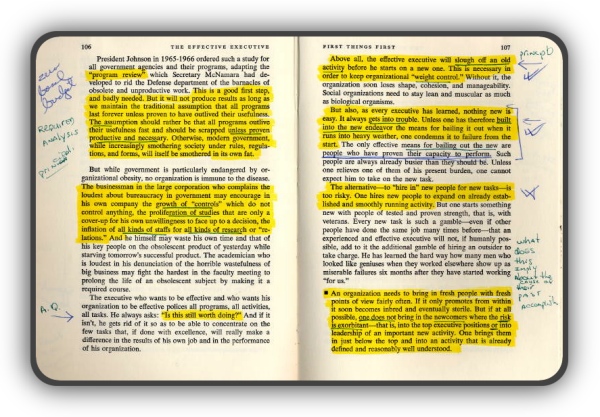
Harvesting and action thinking are needed …
Larger view of image below
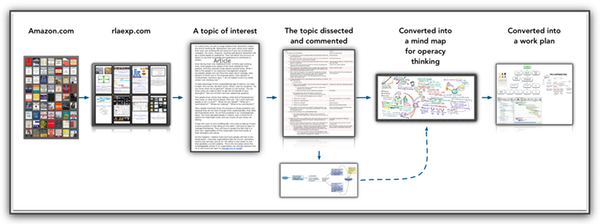
Challenge thinking and an alternative — operacy
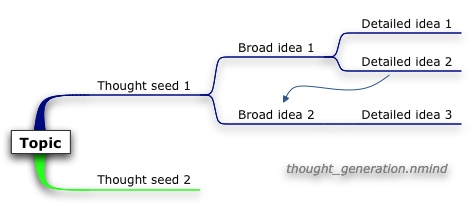
Questions ::: Thinking canvases
Even with excellent analytical tools, concepts, thinking habits …
there is a missing element — the “ecology” of the current time period …
It alters conclusions
The time span: Rolled film to digital to smart phones
Luther, Machiavelli, and the Salmon
an example with major implications.
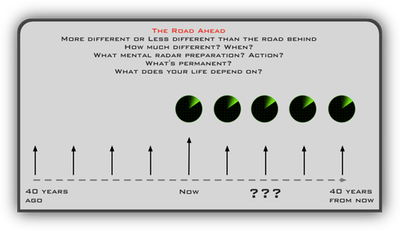
What Everybody Knows Is Frequently Wrong ::: If You Keep Doing What Worked in the Past You’re Going to Fail ::: Approach Problems with Your Ignorance—Not Your Experience ::: Develop Expertise Outside Your Field to Be an Effective Manager ::: Outstanding Performance Is Inconsistent with Fear of Failure ::: You Must Know Your People to Lead Them ::: People Have No Limits, Even After Failure ::: Base Your Strategy on the Situation, Not on a Formula — A Class With Drucker: The Lost Lessons of the World's Greatest Management Teacher
Preceding action harvesting from a specific topic, there is a need for exploration and creation of a “curiosity collection” and “interest profile”.
Somewhere and somehow the seeds of tomorrowS need to be collected
More needs to be said here … The image above is a hint
The process in presented in greater detail
beginning on the introduction page
As a person is exploring they need a way to note areas of interest, quotations, and where they found them.
Time investment clues
Larger view of image below — a thought container.
Scrivener
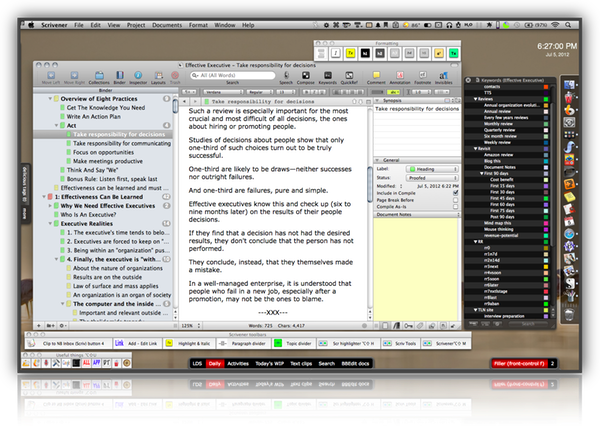
From thought collection to action thinking
Part of the action thinking (mission, … objectives … how) involves making connections.
Maybe to something in the thought collector …
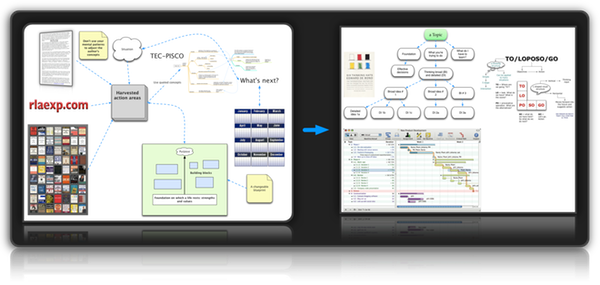
Larger

These lists are derived my DEVONthink Pro article database. This database has over twenty thousand (and growing) articles (in text format). These are not just routine articles, but those that shed some light (direct attention) to some kind of strategic example. Taken together they create a picture of our unfolding world. Each could be superimposed on the economy. Each could be explored to discover the implications. The future that has already happened.
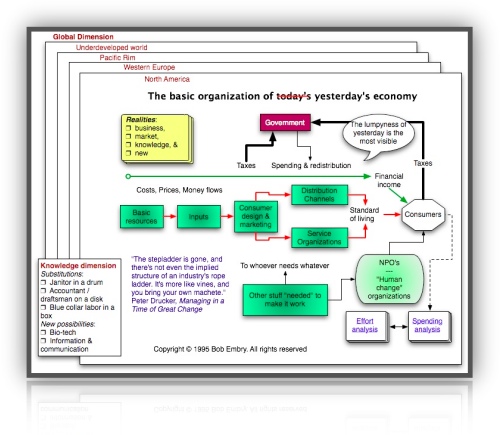
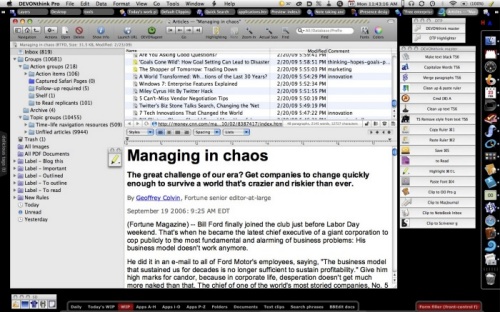
DEVONthink
Article Lists:
February 1, 2025 New home for article titles
Cumulative list ↓
2015
 January through March 2015 January through March 2015
 April through June 2015 April through June 2015
 July through September 2015 July through September 2015
 October through December 2015 October through December 2015
2014
 January through March 2014 January through March 2014
 April through June 2014 April through June 2014
 July through September 2014 July through September 2014
 October through December 2014 October through December 2014
2013
 January through March 2013 January through March 2013
 April through June 2013 April through June 2013
 July through September 2013 July through September 2013
 October through December 2013 October through December 2013
2012
 January through March 2012 January through March 2012
 April through June 2012 April through June 2012
 July through September 2012 July through September 2012
 October through December 2012 October through December 2012
2011
 January through March 2011 January through March 2011
 April through June 2011 April through June 2011
 July through September 2011 July through September 2011
 October through December 2011 October through December 2011
2010
 January through June 2010 January through June 2010
 July through December 2010 July through December 2010
 2004 through 2009 blog clips notebook no longer online (still available) 2004 through 2009 blog clips notebook no longer online (still available)
 Earlier Earlier
Only Connect …
From Peter Drucker's Post-Capitalist Society
The productivity of knowledge requires increasing the yield from what is known—whether by the individual or by the group.
There is an old American story of the farmer who turns down a proposal for a more productive farming method by saying, “I already know how to farm twice as well as I do.”
Most of us (perhaps all of us) know many times more than we put to use.
The main reason is that we do not mobilize the multiple knowledges we possess.
We do not use knowledges as part of one toolbox.
Instead of asking: “What do I know, what have I learned, that might apply to this task?”
we tend to classify tasks in terms of specialized knowledge areas.
Again and again in working with executives I find that a given challenge in organizational structure, for instance, or in technology yields to knowledge the executives already possess: They may have acquired it, for instance, in an economics course at the university.
“Of course, I know that,” is the standard response, “but it’s economics, not management.”
This is a purely arbitrary distinction—necessary perhaps to learn and to teach a “subject,” but irrelevant as a definition of what knowledge is and what it can do.
The way we traditionally arrange our businesses, government agencies, and universities further encourages the tendency to believe that the purpose of the tools is to adorn the toolbox rather than to do work.
In learning and teaching, we do have to focus on the tool.
In usage, we have to focus on the end result, on the task, on the work.
“Only connect” was the constant admonition of a great English novelist, E. M. Forster.
It has always been the hallmark of the artist, but equally of the great scientist—of a Darwin, a Bohr, an Einstein.
At their level, the capacity to connect may be inborn and part of that mystery we call “genius.”
But to a large extent, the ability to connect and thus to raise the yield of existing knowledge (whether for an individual, for a team, or for the entire organization) is learnable.
Eventually, it should become teachable.
It requires a methodology for problem definition—even more urgently perhaps than it requires the currently fashionable methodology for “problem solving.”
It requires systematic analysis of the kind of knowledge and information a given problem requires, and a methodology for organizing the stages in which a given problem can be tackled—the methodology which underlies what we now call “systems research.”
It requires what might be called “Organizing Ignorance” (The title of a book I began to write forty years ago but never finished.)—and there is always so much more ignorance around than there is knowledge.
Specialization into knowledges has given us enormous performance potential in each area.
But because knowledges are so specialized, we need also a methodology, a discipline, a process to turn this potential into performance.
Otherwise, most of the available knowledge will not become productive; it will remain mere information.
Not to see the forest for the trees is a serious failing.
But it is an equally serious failing not to see the trees for the forest.
One can only plant and cut down individual trees.
Yet the forest is the “ecology,” the environment without which individual trees would never grow.
To make knowledge productive, we will have to learn to see both forest and tree.
We will have to learn to connect.
The productivity of knowledge is going to be the determining factor in the competitive position of a company, an industry, an entire country.
No country, industry, or company has any “natural” advantage or disadvantage.
The only advantage it can possess is the ability to exploit universally available knowledge.
The only thing that increasingly will matter in national as in international economics is management’s performance in making knowledge productive.
Connection links
You may find it useful is to mentally superimpose an important article on a terrain map; the changing social and economic picture; and the structure of the economy or its equivalent in the social and public sectors. Articles can also be used with an intel map that connects the previous areas of thought with changes and time spans. Below are the "icons" for each of the tools mentioned earlier in this paragraph.
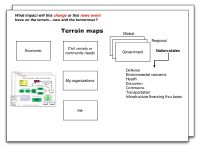
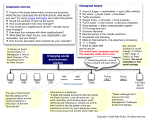
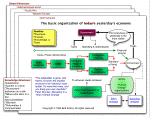
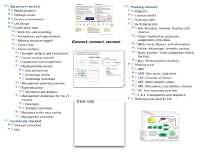

|
#tgd
“The greatest danger
in times of turbulence
is not turbulence;
it is to act
with yesterday’s logic”.
— Peter Drucker
The shift from manual workers
who do as they are being told —
either by the task or by the boss —
TO knowledge workers
who have to
manage themselves ↓
profoundly challenges social structure …
“Managing Oneself (PDF) is a REVOLUTION in human affairs.” …
“It also requires an almost 180-degree change in the knowledge workers’ thoughts and actions from what most of us—even of the younger generation—still take for granted as the way to think and the way to act.” …
… “Managing Oneself is based on the very opposite realities:
Workers are likely to outlive organizations
(and therefore, employers can’t be depended on for designing your life),
and the knowledge worker has mobility.” ← in a context
“More than anything else,
the individual
has to take more responsibility
for himself or herself,
rather than depend on the company.”
continue ↓
“Making a living is no longer enough
‘Work’ has to make a life .” continue
… finding and selecting the pieces of the puzzle
The Second Curve

These pages are attention directing tools
for navigating changing worldS — worldS relentlessly
moving toward unimagined futures.

What’s the next effective action on the road ahead

It’s up to you to figure out what to harvest and calendarize
— working something out in time (1915, 1940, 1970 … 2040 … the outer limit of your concern) — nobody is going to do it for you.
It may be a step forward to actively reject something (rather than just passively ignoring) and then working out a plan for coping with what you’ve rejected.
Your future is between your ears and our future is between our collective ears — it can’t be otherwise.
A site exploration: The memo THEY don't want you to see

To create a rlaexp.com site search, go to Google’s site ↓
Type the following in their search box ↓
your search text site:rlaexp.com

What needs doing?

#z98 Copyright 1985 through 2025 © All rights reserved | bobembry bobembryusa bobembry.usa | bob embry robert embry | “BrainroadS toward TomorrowS” | “time life navigation” © #TimeLifeNavigation | “life TIME investment system” © #LifeTimeInvestmentSystem | “career evolution” © #CareerEvolution | “work-life horizons” © | “work-life evolution” © | “financial investing” © | “life design” © #LifeDesign | “organization evolution” © | #OrganizationEvolution | “brainroads toward tomorrows” © | #BrainroadsTowardTomorrows | “foundations for future directed decisions” © | #FoundationsForFutureDirectedDecisions | #rlaexpdotcom © | rlaexpdotcom ©
#rlaexp.com = rla + exp = real life adventures + exploration or explored
exploration leads to explored
Examples ↑ can be found through web searches, Wikipedia,
Pinterest and the daily news
Knowledge Worker tools on Pinterest
Some ecological and time awareness ↓ → Ken Burns films

Larger view thinking canvas
The Über Mentor
The Drucker Lectures:
Essential Lessons on
Management, Society, and Economy
A Year with Peter Drucker:
52 Weeks of Coaching
for Leadership Effectiveness

Larger view thinking canvas
#mlp ↓ #z99
My launching pad
(fully responsible officer,
knowledge-worker, professional contributor
and executive)
Discontinued Operations
Worldview
|
|
![]()

![]()